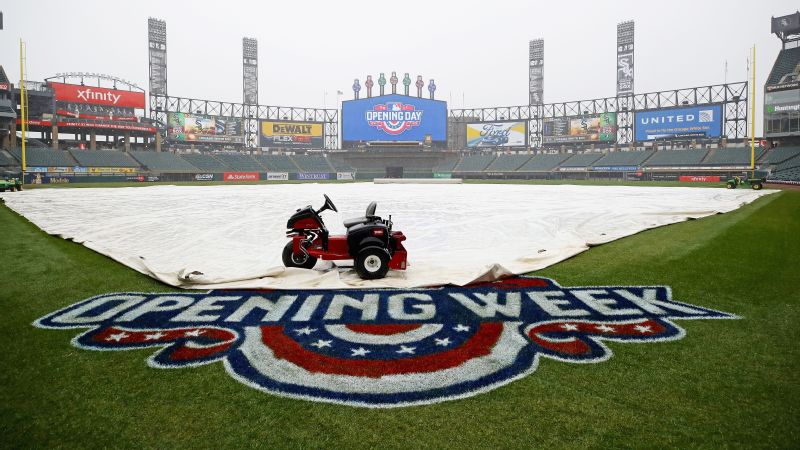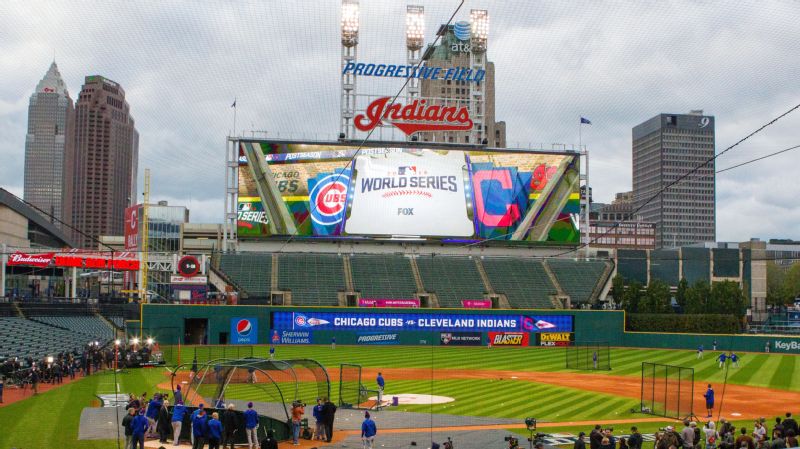
Rain threatened the Opening Day game between the Chicago White Sox and Detroit Tigers at Guaranteed Rate Field on Monday.
I grew up in a baseball family — not the kind of family that insists that everyone gather round to watch the game together, or that everyone play the sport, but enough so that I knew the game well.
I knew its smells, its sounds, its lingo. I knew that spring training meant flats of Florida strawberries and sweatshirts at the ballpark, that April meant baseball was back.
From a young age, I knew what Shakespeare meant by “the uncertain glory of an April day” as it pertained to baseball.
In Marianne Moore’s poem “Baseball and Writing,” she agrees with Shakespeare’s line, writing that, “You can never tell with either / how it will go / or what you will do.”
April marks two momentous events: the start of the baseball season and National Poetry Month.
After a winter of indoor courts, April is when we play — and watch — baseball outside again. We have hope that our favorite team will win this year. And good athletes make winning look easy; their prowess is exhilarating and inspiring.
Think of all the training a baseball player undergoes — physical strength building, stamina practice, hand-eye coordination, learning rules and memorizing strategies … all of it leading to a simple, elegant performance that must be executed with ease.
A good poem also makes writing a poem look easy. Like a zen koan, you are forced to stop thinking and only do, only feel. A good poem doesn’t answer anything, but it draws your attention to something deep.
In the baseball movie “Bull Durham,” actress Susan Sarandon’s worldly character Annie Savoy quotes poet Walt Whitman: “I see great things in baseball. It’s our game, the American game. It will repair our losses and be a blessing to us.”
The accuracy of the quote is somewhat fuzzy, but the sentiment remains. What Whitman did say is that “baseball is our game: The American game: I connect it with our national character.”
Indeed, what does baseball have to say about our “national character”? I think we can look to poetry. First, baseball offers us nostalgia, that feeling we conjure when the present is uncomfortable. In “Grand Slam,” poet Marjorie Maddox writes of “the glory of our baseball days.”
And poet Gail Mazur writes that “the ball park is an artifact, manicured, safe, scene in an Easter egg.” We long for that same assuredness in our national character — the dream of a manicured lawn and a painted sugar house.
Despite its complex rules and long innings, baseball is simple: bat hits ball, runner comes home. In “Analysis of Baseball,” May Swenson agrees: “It’s about / home, and it’s / about run.”
Swenson is right: No matter how much running there is, baseball really is about home. We are a nation of immigrants, a nation of people looking for home, either from the past or in some imagined future.
But really, our home is right at our feet, in the dirt we stand on. We’re already there. Our home is here.
This is how baseball can “repair our losses and be a blessing to us.” It can, like poetry, get us to pay attention to its smells and its sounds. When we feel like we’re wandering, it can bring us home.
Carrie Ann Welsh is a writer based in Wisconsin.





